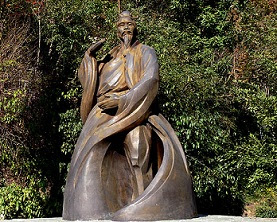He did not sit for seven years in a cave.
Where is his Backpack?
Why are his clothes not dirty?
Is he a Fang-shih?
Why Did the Bodhidharma Walk So Far Away?
Two old friends were resting after morning chores on the farm. They sat and watched the busy traffic on the dirt road from Wuhan to Huarong.
Seigen asked Obaku: "What was Master Bodhidharma's intention in walking west from India to China?"
Obaku, a Taoist scholar, answered: "He likely preferred the warmer winters of Wuhan to the blizzards in Tibet. Or, he just enjoyed backpacking for great distances back and forth."
Seigen, a Chan man, said: "Really, Obaku, don't you believe he traveled to spread the Buddha Dharma to our Chinese people?"
Obaku replied: "Maybe, but why then did he choose to sit in silence facing a stone wall for seven years in China? How could he help others in so doing? He could have died from such extreme austerities. And, he could have saved Dazu Huike's arm. He should have spent the time learning to speak, read, write, and teach in Chinese."
Seigen, a bit annoyed, said; "But, Obaku, was he not a great leader at the Shaolin Temple in Luoyang and the Sixth Patriarch of Chan Buddhism?"
Obaku retorted: "He could have been more gracious towards the generous and kind Emperor Wu. Was he not sort of a rough Tibetan hardened fellow, a Foreigner? His alleged name, "Bodhidharma," seems suspicious to me."
Seigen would not give up, and said: "What? Did not the Bodhidharma bring vital bodily exercises and martial arts to those lazy Shaolin monks?"
Obaku replied: "The Chinese people were doing many longevity exercises and internal alchemy practices a thousand years before the Bodhidharma arrived. Hua Tuo and He Gong were more influential in this respect for more people."
Seigen said: "The Bodhidharma lived for 150 years to show his great healing powers."
Obaku snorted: "50 years or 150 years ... In the end we all rot in our graves. Only but a few are reborn as the fictions of legends."
Seigen responded: "Obaku, you are full of harsh judgments today. I sense a bit much of the judgmental thinking of the Action and Karma brothers of your creed; also, your being rather chauvinistic about our beloved Chinese heritage."
Obaku replied: "You are correct, Seigen! Too much judging distorts our greater awareness, and threatens wisdom. Also, I should be more respectful of the Patriarchs and our shared new insights. I'm sorry old friend.
Seigen said: "You are also correct, Obaku. I must curb my hero worship and simple love of legends. Anyway, back to some quiet sitting, my brother."
Obaku's daughter brought them both a cup of hot tea. They sipped in silence. They listened to the oxen carts rattling by on the road, and watched the many walkers traveling west. A smattering of being enlightened occurred for both of them.
Considerations
Too much sitting stiffens the body-mind.
Even the Bodhidharma made the monks work more.
Many Chan monks distained learning and reading,
and because they could not read.
Beware of overgrown imagination and legends.
Question the scriptures and tales.
Don't read with one eye blind.
Beliefs can disrupt sound judgments.
Without right judgments we cannot flourish.
Friendships close the door to petty arguments.
Comments, Sources
Refer to Master Dogen's Shinji Shobogenzo, Case 10.
Refer to my Cloud Hands Blog Posts on the topic of Koans/Stories.
Pulling Onions Over 1,043 One-line Sayings by Mike Garofalo
Chinese Chan Buddhist and Taoist Stories and Koans
Refer Also to Fireplaces, Hearths, Campfires, Stoves
The painting shown at the top of this post is from the book: The Chinese Art Book, p. 182. It was a famous oil on canvas painting made in 1967 by the artist Liu Chunua. It is titled: Chairman Mao Goes to Anyuan.
The Fireplace Records By Michael P. Garofalo
- Gateless Barrier, Case 37
- Blue Cliff Record, Case 17
- Blue Cliff Record, Case 73
- Blue Cliff Record, Case 20













